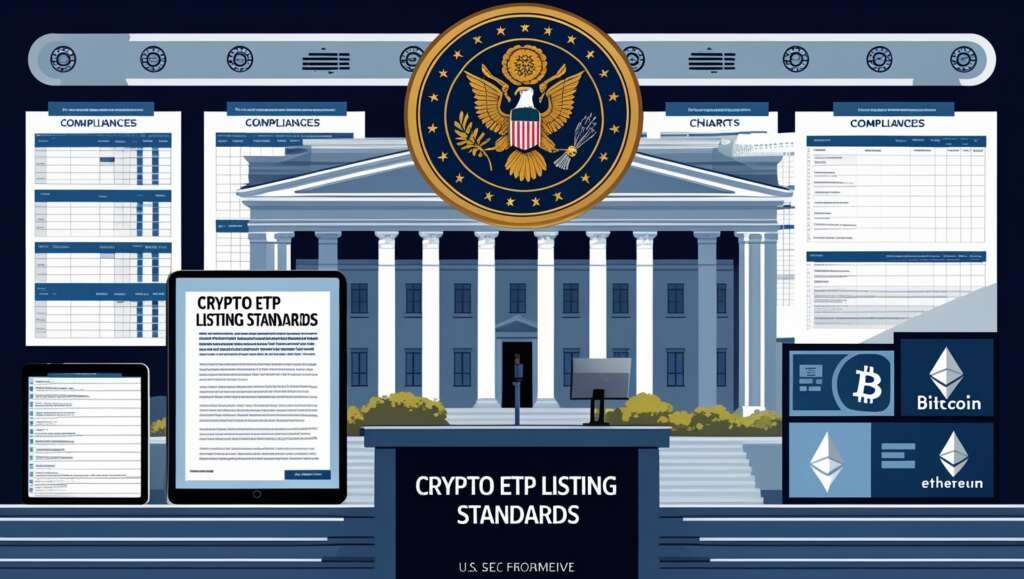The United States SEC has published new exchange filings outlining generic listing standards for crypto asset Exchange-traded products (ETPs). According to a post made by ETF analyst Eric Balchunas, any token with over six months of futures trading on Coinbase’s derivatives exchange would qualify, potentially covering a dozen major assets.
Eric believes approvals could begin as early as September or October. The news comes at a time when CBOE BZX and NYSE Arca filed for Generic Listing Standards for ETPs. If adopted, approval timelines for crypto ETPs could be reduced from 240 days to 75 days, signalling a constructive shift under the new SEC leadership.
More Details About the Listing Standards
The SEC on July 1, 2025, published a formal staff guidance on how reporting requirements under the Securities Act (1993) and Exchange Act (1934). Under the two Acts, the guidance revealed how the disclosure requirements applied to crypto ETPs, an investment vehicle that holds spot digital assets or their derivatives on national securities exchanges. The guidance, roughly a dozen pages of documents, talked about the following:
- Clear language descriptions of underlying digital assets, networks, and consensus mechanisms in use, and spot/derivatives trading
- Risk factor disclosures on volatility, custody failure, market manipulation, and cybersecurity.
- Business methodology and how asset value is calculated.
- Third-party relationships and custody arrangements.
- Conflict of interest between crypto holders and affiliate transactions.
- Financial statements for each category of filings in a trust or partnership structure.
A key follow-up from this was the streamlined listing standards. Currently, a new crypto ETP requires a Form 19b-4 submission, which takes 240 days for the SEC to review. Exchanges or issuers must negotiate each item exemption for the new token. However, the proposed listing standards, promoted by Cboe, would set generic rules, such as tokens that have been traded on Coinbase derivatives markets for six months, would qualify under the standard, navigating the full bespoke filings.
If the proposed listing standards are adopted, approval timelines for crypto ETPs will significantly reduce from 240 days to 75 days. That means each token ETP will launch swiftly under the new framework. Solana and XRP ETPs, as well as other filings, could see approvals by September/October, according to Eric.
What the New Listing Standards Framework Means for Crypto ETPs
With disclosure requirements and listing framework published, the SEC has become open to approving token ETPs beyond Bitcoin or Ether. This broadened access to tokens means that alternative assets, such as SOL, XRP, and others, could see approvals soon.
Additionally, bypassing the conventional Form 19b-4 submission allows for quicker product launches. Exchanges or issuers don’t need to wait 240 days again to see approvals, as individualized filings are eliminated.
Investors have greater insight into custody structures and risk exposures, enabling transparency at the highest form. They won’t be caught unaware or deceived into investing in a crypto ETP. Smaller firms, however, may struggle with filing costs, given that each item must be filed individually.
SEC Approves In-Kind Creations and Redemptions for Crypto ETPs
Following the release of the new listing standards, the SEC approved in-kind creations and Redemptions for crypto ETPs. This would enable authorized exchanges and issuers to swap shares directly for an underlying digital asset, rather than cash. Bitcoin and Ether funds will now be allowed to create or redeem shares in-kind, according to Tuesday’s announcement.
The SEC’s Division of Trading and Markets Director, Jamie Selway, in a statement, said the new rules will make crypto ETPs less costly and more flexible to ETP authorized participants. SEC’s Chair Paul Atkins said, “It’s a new day at the SEC, and a key priority of my chairmanship is developing a fit-for-purpose regulatory framework for crypto asset markets.”
In 2024, when the SEC approved spot Bitcoin and Ether ETFs, it only allowed cash redemptions. Since then, firms like BlackRock have voiced their displeasure with the model, requesting a shift to in-kind redemptions. The collective interest in in-kind redemptions hastened the SEC’s approval, although Hester Peirce had revealed that provision was made for in-kind creations and redemptions.
Pro-Crypto Policies Finally Taking Shape
The shift to in-kind creations and redemptions, followed by the new listing standards, reflects Donald Trump’s crypto promises. Fulfilling these promises reflected earlier this month when he signed the GENIUS Act, a bill that regulates stablecoin use, issuance, and disclosure.
As Trump continues to support the blockchain sector, momentum is building around crypto ETFs, especially around spot Bitcoin and Ether ETFs. U.S. Bitcoin ETFs hold more than $1.2 million BTC, according to Bitbo.




